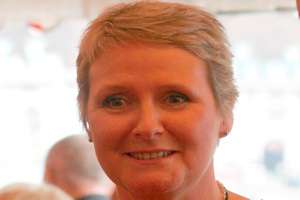Ovarian cancer survivor backs study to improve screening

A woman from Manchester has warned other women of the need to be aware of ovarian cancer, especially if you have a family history of the disease, as part of Ovarian Cancer Awareness Month.
Lorraine Benn, aged 53, from Worsley, also backed The University of Manchester's current research – the largest to date – which is looking into whether or not screening for ovarian cancer can help to improve survival.
Lorraine, was born one of four sisters. Tragically two of her sisters, Anita and Georgina, died of Ovarian Cancer but her sisters' deaths ultimately saved her life.
Lorraine said: "Anita was just 41 years old when she was first diagnosed with Ovarian Cancer. She fought the disease for seven years but lost that battle 17 years ago.
"Georgina was diagnosed with Ovarian Cancer three years ago at the age of 58. She died 18 months later.
"Because of our family history my surviving sister Susan and I approached the consultant and he agreed that we should both have elective hysterectomies as a precaution.
"When the results came back from histology, Susan was clear but I had stage 2 Ovarian Cancer.
"I hadn't had any symptoms at all and there was nothing to suggest anything was wrong. If I hadn't had the operation when I did, things could have turned out very differently.
"I began a course of chemotherapy but I wanted to know more about why three out of four previously healthy sisters could be affected by this cancer. We pushed and pushed for genetic testing and they eventually agreed due to our family history.
"Again Susan was clear but I was carrying the BRAC 2 gene, which meant I was susceptible to all female Cancers. Not only was I battling Ovarian Cancer but there was a very real risk that I would develop breast cancer as well.
"Sure enough months later following a routine mammogram they found a stage one tumour in my left breast.
"A full mastectomy and a further course of chemotherapy followed and I am currently on a course of Tamoxifen.
"But the important part of my story is that I am here to tell it.
"Thanks to early detection it seems for now that I have a good chance of beating both types of female cancer.
"But what struck me was how differently the two are treated. There is almost a veil of secrecy over Ovarian Cancer, nobody likes to talk about it, it's almost embarrassing to admit you've got it and there is a limited amount of written information about it.
"Breast Cancer on the other hand is very much at the forefront of people's minds, lots of awareness, and there's an almost upbeat feel to how people approach it. Thanks to the Eve Appeal people like me are learning that it is very important to talk about gynocological cancers. By sharing experiences and promoting the need for early detection and awareness we can show they are survivable. And I'm living proof of that."
Because ovarian cancer is often not diagnosed until it is at an advanced stage, prognosis is generally poor. Currently 7,000 women are diagnosed with the disease in the UK each year. Of those more than 4,000 are not expected to survive but if women are diagnosed earlier 90% of those cases could beat the disease.
The University of Manchester is a participating centre in the UK Collaborative Trial of Ovarian Cancer Screening (UKCTOCS) which is the largest randomised, controlled trial to date to assess whether or not screening for ovarian cancer can help to improve survival.
In this study, more than 200 000 women have been enrolled and randomly assigned to one of three groups: control (no treatment/screening); annual screening for CA125 concentration and transvaginal ultrasound; or annual screening with ultrasound alone.
Both screening techniques seem to be feasible on a large scale and are showing promising signs of identifying ovarian cancers at an early stage.
Professor Jacobs, Vice President of The University of Manchester and Dean of the Faculty of Medical and Human Sciences, said: "Over the last 15 to 20 years we've really begun to understand the factors which predispose women to ovarian cancer. We can now begin to categorise women into low, high and medium risk categories for ovarian cancer.
"We have shown that our screening tests can pick up the cancer one to two years before most women will develop any symptoms of ovarian cancer.
"What we hope is that this will be early enough in the course of the disease for treatment to be more effective and so that we can save lives."
The study is due to finish in December 2014 and final results will be published in 2015.
















